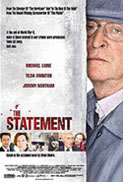

Opening 23 Jun 2005
Directed by:
Norman Jewison
Writing credits:
Ronald Harwood, Brian Moore
Principal actors:
Michael Caine, Tilda Swinton, Jeremy Northam, Alan Bates, Charlotte Rampling
The subject is war crimes and the moral dilemma created when a country asks its young people to kill and the even deeper moral quagmire when one’s church either supports or opposes that effort. “The self-examination and self-deception that one must do to rationalize, equivocate and justify ones actions, resulting in troubled consciences wrestling with responsibility and hypocrisy.*” The role of individual conscience in collective evil doing.
The Statement was a novel written by Brian Moore, an Irish Catholic, fascinated by the real life story of Paul Touvier, a former French Vichy officer who, after the war, was convicted of treason and sentenced to death but escaped and was on the run for fifty years, supported and sheltered by a network of right wing clergy of the French Catholic Church.
In his 20s Touvier had headed the militia's intelligence unit, fighting the Resistance and deporting Jews. In June of 1944 he had selected seven Jews to be shot as hostages in revenge for the killing of a Vichy government official. In 1946 he was tried and sentenced to death in absentia and finally arrested after a robbery of a bakery, but escaped police custody, bringing into suspicion the involvement of high ranking ex-Vichy government officials.
In 1971, he was pardoned by President Pompidou in the name of national reconciliation, amidst a great public outcry, as much of his personal property was found to have been seized from deported Jews. He was charged with crimes against humanity but again escaped police custody and in 1989 was finally found hiding in a Monastery in Nice, rearrested, tried and convicted.
There is still controversy surrounding the actions of the Catholic Church towards the persecution of Jews during the war. The Church presumably feared a godless Communism more than the stain of collaboration with the anti-Semitic Nazis. Although the Vatican remained neutral during the War, Pope Pius X11 publicly condemned the Nazi actions and allowed Jews throughout Italy to seek shelter in the Church. Hitler had replied that "there is no future with churches; one is either a Christian or a German. One cannot be both."
The film is dedicated to those seven murdered French Jews and the 77,000 other French Jews that perished under German occupation and the Vichy Regime. Its director and co-producer is Norman Jewison, nominated for seven Oscars for Fiddler on the Roof, Moonstruck, The Russians Are Coming, In the Heat of the Night, and The Thomas Crown Affair.
Michael Caine is brilliant as the former Vichy officer Pierre Brossard, running from both the French government and another killer protecting some one else's dark secrets. Tilda Swinton plays the ambitious French judge determined to track him down with the help of an officer of the French Army, played by Jeremy Northam, as the police cannot be trusted.
The director's son, Kevin Jewison as director of photograhy, effectively captures scenes of the French countryside as well as small French villages, helping to create a very real and thrilling historically based drama.
*Quote from The New York Times on the novel The Statement by Brian Moore, "A Question of Conscience" by Eugene Weber, 1996 (Patricia Ritz)